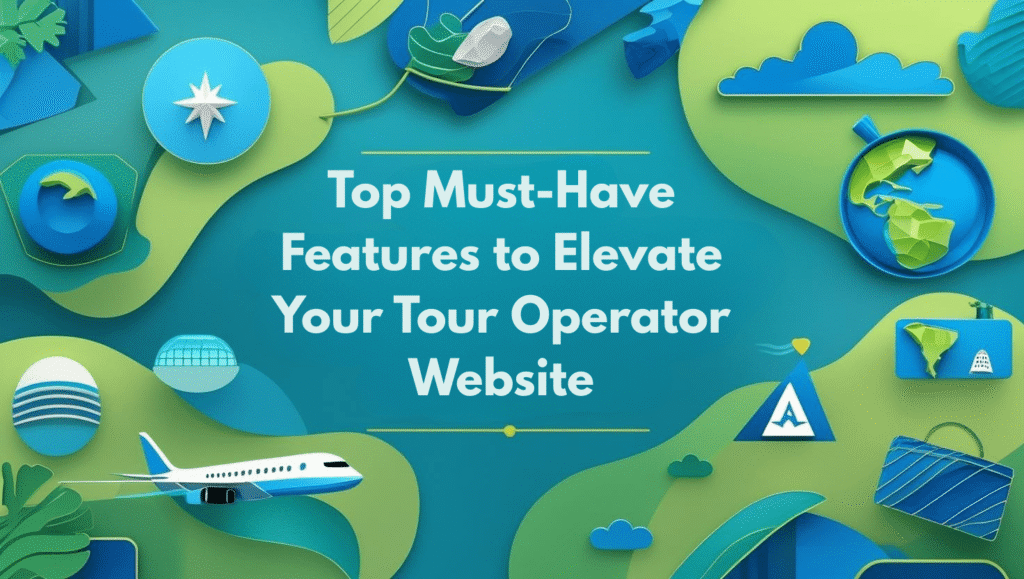Top 10 Website Features Tour Operators Must Have to Boost Bookings
Summary: A high-performing tour booking website requires more than good visuals; it needs smart, user-focused features. Essential elements like real-time booking, mobile responsiveness, secure payments, live chat, SEO content, and custom itinerary tools help attract, engage, and convert travelers. Building such a site also involves strategic planning, from choosing the right platform to optimizing user experience. By tracking key performance metrics like conversion rates and bounce rates, tour operators can fine-tune their digital presence. Investing in a well-built website ultimately leads to more bookings, better customer trust, and sustainable business growth in the competitive travel industry.
Key Takeaways:
Turn your website into a 24/7 booking powerhouse.
Real-time availability builds trust and boosts instant conversions.
Mobile-ready design captures bookings from travelers on the go.
Custom itineraries increase engagement and booking intent.
Track performance metrics to optimize for more sales.
Most travelers now plan and book their trips online, exploring destinations, comparing packages, reading reviews, and finalizing bookings within minutes. For tour operators, a strong online presence isn’t just beneficial, it’s essential. A visually appealing website must also be functional, intuitive, and designed to support the entire customer journey from discovery to conversion.
A modern travel website should offer more than just basic information. It needs to provide real-time availability, seamless mobile access, secure payment options, and engaging content that fosters trust. The right combination of features can help tour companies reduce bounce rates, increase bookings, and stand out in a highly competitive industry.
Table of Contents
Toggle- List of Must-Have Features For Tour Operator Websites
- 1. Real-Time Booking Engine with Calendar Integration
- 2. Mobile-Optimized, Responsive Design
- 3. Interactive Tour Search & Filters
- 4. High-Quality Visuals with Video Integration
- 5. Integrated Payment Gateway with Currency Converter
- 6. User Reviews, Ratings & Testimonials
- 7. Custom Itinerary Builder or Quote Request Tool
- 8. Multilingual & Multi-Region Support
- 9. SEO-Optimized Blog & Destination Pages
- 10. Live Chat & Chatbot for Instant Support
- Key Strategies to Develop a Tour Booking Website
- Performance Metrics to Track Tour Website Success
- Why Tour Operators Choose Agha DigiTech
- Final Thoughts
- Frequently Asked Questions (FAQ's)
List of Must-Have Features For Tour Operator Websites

A tour & travel agency website must do more than just list destinations. It should guide users toward making decisions, answer their questions in real-time, and convert interest into action. Including the right set of features can streamline the customer journey, build trust, and significantly boost your booking rates. Below are the must-have website features every tour operator or travel company should prioritize.
1. Real-Time Booking Engine with Calendar Integration
A real-time booking engine allows travelers to instantly reserve tours without needing to wait for a confirmation. Integrated with a calendar, it displays available dates, tour slots, or seat counts, reducing back-and-forth communication. This makes the booking process fast, transparent, and stress-free. With travelers expecting instant results, this feature plays a vital role in capturing spontaneous decisions and turning browsing sessions into successful transactions.
Benefits to the Business
Increases direct bookings
Eliminates booking delays
Enhances user satisfaction
- Reduces reliance on manual coordination
2. Mobile-Optimized, Responsive Design
With more than half of travel bookings happening on smartphones, having a mobile-responsive website is essential. It ensures that your content, images, and booking forms look and function perfectly on every screen size. Mobile-friendly design also improves site speed, readability, and navigation, key factors for retaining visitors. Search engines reward mobile-optimized websites with better rankings, helping you attract more traffic and increase conversions from mobile users.
Benefits to the Business
Reduces bounce rate
- Improves Google search ranking
- Boosts mobile and tablet conversions
- Enhances user experience on all devices
3. Interactive Tour Search & Filters
Travelers often know what they want their destination, type of activity, budget, or travel dates. Interactive filters and a powerful search bar help users easily sort and find relevant tours. This improves navigation, makes large tour catalogs easier to browse, and ensures users stay longer on your site. By streamlining the discovery process, you reduce confusion and increase the likelihood that users will proceed to booking.
Benefits to the Business
Increases time on site
Reduces user frustration
Boosts engagement and conversions
- Helps users find relevant packages faster
4. High-Quality Visuals with Video Integration
Great visuals do more than just decorate a website; they sell the experience. High-resolution images, 360-degree views, and immersive videos transport users to their dream destinations. Integrating videos such as tour overviews or traveler testimonials can trigger emotional responses, helping users imagine themselves on the trip. This emotional engagement builds trust and makes the decision to book much easier for potential customers.
Benefits to the Business
- Builds trust and authenticity
- Increases emotional connection
- Improves engagement and time on site
- Enhances the perceived value of tours
5. Integrated Payment Gateway with Currency Converter
A secure and easy-to-use payment gateway is vital for closing sales. Offering multiple payment options and currency conversions builds convenience for both domestic and international customers. Transparent pricing, combined with smooth checkout experiences, helps reduce drop-offs. The easier it is to pay, the more likely users are to complete their booking, especially for users traveling from outside your home country.
Benefits to the Business
Supports global transactions
Reduces booking abandonment
Enhances customer confidence
Improves overall conversion rates
6. User Reviews, Ratings & Testimonials
Travelers rely heavily on reviews before making decisions. Featuring user ratings, testimonials, and third-party reviews adds powerful social proof to your site. Integrating with trusted platforms like TripAdvisor or Google Reviews further validates your service quality. Positive reviews influence first-time buyers, increase transparency, and give prospects a reason to trust your brand before booking their trip.
Benefits to the Business
Builds credibility instantly
- Increases conversion rates
- Encourages bookings through social proof
Enhances SEO via user-generated content
7. Custom Itinerary Builder or Quote Request Tool
Not all travelers want pre-packaged tours. A custom itinerary builder lets users select destinations, activities, and durations to match their unique preferences. Alternatively, a quote request form captures detailed information about user needs. These tools create personalized experiences that increase engagement while providing your sales team with high-quality leads they can convert more easily.
Benefits to the Business
- Increases chances of conversion
Encourages user interaction
Enables custom pricing and packages
- Captures serious, high-intent leads
8. Multilingual & Multi-Region Support
Offering multiple language and currency options makes your website accessible to a global audience. This not only improves user experience but also signals professionalism and inclusivity. It allows international travelers to explore and book with ease, while also boosting your chances of ranking in different regional search engines. Catering to diverse users opens up new revenue streams from untapped markets.
Benefits to the Business
Expands reach to global customers
Improves trust and user comfort
Supports region-specific SEO strategies
Increases bookings from international traffic
9. SEO-Optimized Blog & Destination Pages
A well-maintained blog focused on destinations, travel tips, and trending topics draws valuable organic traffic. SEO-optimized landing pages for tours and locations improve your visibility in search results, helping you rank for long-tail travel-related queries. Valuable content not only attracts potential travelers but also positions your brand as an expert, building loyalty over time.
Benefits to the Business
- Builds brand authority
- Drives organic traffic consistently
- Improves Google search ranking
- Generates qualified leads over time
10. Live Chat & Chatbot for Instant Support
Live chat and chatbots offer immediate answers to common traveler questions. Whether it’s about pricing, availability, or visa concerns, real-time communication builds trust and helps users move faster through the booking funnel. Even outside business hours, a chatbot ensures visitors get the help they need without delay, keeping them engaged and reducing drop-offs.
Benefits to the Business
Increases lead engagement
Reduces abandoned bookings
- Provides 24/7 customer support
- Builds confidence in decision-making
Key Strategies to Develop a Tour Booking Website
Building a successful tour booking website requires more than just good design. It involves strategic planning, the right technology stack, and user-centric features that convert visitors into paying travelers. Here are the key strategies every tour operator should implement while developing or revamping their travel website:
- Prioritize User Experience (UX) Design: Ensure the website layout is clean, intuitive, and easy to navigate. Travelers should find tours, check availability, and book with minimal clicks. Clear CTAs, consistent design, and fast load times help users stay focused and engaged throughout their journey.
Choose the Right CMS or Framework: Select a content management system (CMS) or framework that allows flexibility and scalability. WordPress, Webflow, or custom-built platforms with booking plugins can be tailored to meet your specific needs. Ensure it supports multilingual content, SEO customization, and easy integration with APIs.
- Integrate with Tour Management and CRM Systems: Streamline operations by connecting your website with a tour booking or CRM system. This enables real-time syncing of tour availability, customer data, and payment status, saving time and enhancing accuracy across your business operations.
- Design for Mobile-First Functionality: Use a mobile-first approach from the start of development. Optimize every element from images to navigation and booking forms for seamless mobile use. Mobile-first websites load faster and convert better, especially among travelers who book on the go.
- Implement Smart Search and Filters: Utilize dynamic search and filtering tools that adapt to user preferences. Search bars with autocomplete, filters for tour type, budget, and destination, and real-time updates enhance usability, helping customers find their perfect experience faster.
- Optimize Every Page for SEO: Develop the site with SEO in mind, clean URL structures, optimized meta tags, keyword-rich content, and fast-loading pages are essential. Incorporate schema markup for tours and locations to improve visibility on search engines and enhance click-through rates.
- Ensure Secure & Fast Payment Integration: Use trusted, PCI-compliant payment gateways and SSL encryption to build trust and protect customer data. Reduce booking friction by allowing multiple payment options, currency support, and mobile-friendly checkout pages.
- Include Lead Capture and Follow-Up Tools: Add newsletter signups, exit-intent popups, quote request forms, or “save this tour” features to capture visitor information. Pair these tools with automated email responses or follow-ups via your CRM to nurture leads and convert hesitant visitors into customers.
Performance Metrics to Track Tour Website Success

To understand how well your tour booking website is performing, it’s crucial to track the right metrics. These key performance indicators (KPIs) help you identify what’s working, where users are dropping off, and how to improve your conversion strategy. Below is a detailed table outlining the essential metrics every tour operator should monitor.
| Metric | What It Measures | Why It Matters | Impact on Tour Business |
|---|---|---|---|
| Conversion Rate | Percentage of website visitors who complete a booking or inquiry | Indicates how effectively your site turns visitors into leads or paying customers | Helps assess ROI from marketing efforts and optimize booking funnels |
| Bounce Rate | Percentage of visitors who leave without interacting | High bounce rates can indicate poor UX, irrelevant content, or slow page speed | Identifies weak landing pages or content misalignment that may be costing you leads |
| Average Session Duration | Average time users spend on your website | Longer sessions often indicate better engagement and interest | Shows whether users are finding value in your tours, content, or blog pages |
| Pages Per Session | Average number of pages viewed in a session | Reflects how deeply users explore your site | Helps measure how compelling your content and internal linking structure are |
| Traffic Sources | Where your visitors come from (organic, paid, social, etc.) | Helps you allocate marketing budget more effectively | Identifies which channels deliver the most qualified leads and bookings |
| Mobile vs Desktop Performance | Device-specific engagement and conversion stats | Indicates whether your mobile experience meets user expectations | Helps prioritize mobile optimizations and device-specific design improvements |
| Cart Abandonment Rate | Users who start but don’t complete bookings | Highlights friction in the booking or checkout process | Allows you to refine booking flow, payment options, and build retargeting strategies |
| Form Fill or Lead Submission Rate | Users who submit inquiry or quote request forms | Tracks the effectiveness of lead capture forms | Offers insights into how well your site is generating and qualifying new leads |
| Top Exit Pages | Pages where users most frequently leave your site | Points to content or UX issues on key pages | Helps improve or restructure content to keep users moving through the funnel |
| Organic Keyword Rankings | Your position in search engines for targeted keywords | Shows your SEO success and content visibility | Drives sustained traffic and helps you dominate niche travel markets |
By consistently tracking and analyzing these performance metrics, tour operators can make smarter decisions, improve customer experience, and ultimately increase bookings. A data-driven website isn’t just better, it’s built for growth.
Why Tour Operators Choose Agha DigiTech
Tour operators need more than just an attractive website; they need a powerful digital platform that converts interest into bookings and supports long-term growth. Agha DigiTech specializes in crafting custom websites specifically for the travel and tourism industry. Every feature we build, from real-time booking systems to interactive filters and mobile-first design, is focused on delivering a seamless user experience that encourages visitors to take action.
What truly sets us apart is our insight into how travelers search, compare, and make booking decisions online. We go beyond visuals to implement smart, functional tools like itinerary builders, multilingual content, location-based SEO, and secure, multi-currency payment gateways. Whether you run a local adventure tour company or a global travel agency, we tailor your website to match your goals and audience. With Agha DigiTech, you gain a dedicated partner committed to helping your business stand out and succeed in an increasingly competitive market.
Final Thoughts
A successful tour operator website goes beyond aesthetics it must deliver seamless functionality, intuitive navigation, and traveler-centric features that drive bookings. From real-time availability and secure payments to multilingual content and mobile optimization, every detail contributes to building trust and converting visitors into customers.
As the travel industry becomes more digital and competitive, investing in the right website features and development strategies is no longer optional; it’s essential for growth. Don’t let outdated design or missing functionality hold your business back.
Ready to transform your tour booking website into a conversion machine?
Contact Agha DigiTech today to build a travel website that delivers results.
Frequently Asked Questions (FAQ's)
What essential features should a travel agency website include?
A travel website must include real-time booking, mobile responsiveness, secure payments, SEO-friendly content, high-quality visuals, multilingual support, live chat, customer reviews, and itinerary builders to provide a seamless user experience and boost bookings.
Why is mobile responsiveness vital for tour operator websites?
Mobile responsiveness ensures your website looks and functions well on all devices. With most users booking through smartphones, it helps reduce bounce rates, improves engagement, and enhances your site’s visibility on search engines.
What payment features are critical for tour operators?
Essential payment features include SSL-secured checkout, support for multiple currencies, and integration with trusted gateways like Stripe or Razorpay. These ensure faster, safer transactions and reduce cart abandonment.
Besides bookings, what role do itinerary builders play?
Itinerary builders allow users to customize their travel plans, increasing engagement and lead quality. These tools generate higher user satisfaction and help convert casual browsers into serious inquiries or bookings.
Do travel agency themes or plugins affect website functionality?
Yes, themes and plugins impact site performance, SEO, and usability. Choosing high-quality, tour-specific tools ensures reliable booking functions, faster load times, and a better overall experience for users.




